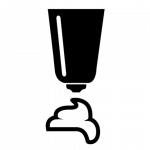The Emukweso Community, which has 140 people, struggles to access sufficient water daily. Their water source, Apondi Spring, is overcrowded and unsafe, and the water they consume makes them sick, but they have no other choice.

Community members waiting to collect water.
Field Officer Jacqueline Kangu described the effects of the community's water crisis. "Community members have suffered severe cases of typhoid, stomachache, diarrhea, and amoeba. Due to difficulty in fetching water, people happen to be overcrowded at the water point. As a result, quarrels come up, and members end up having strained relationships," she said.
30-year-old Rachel Makokha is a farmer and laundress who depends on the ability to work to provide for her family, but her only source of water makes them ill, making it difficult to work, which means her already meager income is lessened.

Rachel collecting water.
"When I am sick, I can't go for water to wash people's clothes as it is my source of income, and this leads to starvation in my family and other basics," shared Rachel.
Watching her children struggle to maintain their health and education is a parent's worst nightmare, one that Rachel experiences every day.
"Last term, my children and I fell sick, and I was not able to seek treatment or buy medicine for all of us," she added.

Rachel, with one of her children, going to collect water.
"When the situation persists, I go to the hospital. Recently, I have spent a lot on treatment, which has affected me in a way that I cannot even pay school fees for my children," continued Rachel.
When she can't work, Rachel can't provide food and other basic needs for her kids. Rachel and her family will continue to stay stuck in the same cycle, missing out on crucial activities that make a better future for themselves. Without school, her children will have a challenging time chasing their dreams.
Access to clean, safe water empowers individuals to thrive! It would allow Rachel to pursue her business while ensuring her children attend school consistently, preparing them for a better future.
Steps Toward a Solution
Our technical experts worked with the local community to identify the most effective solution to their water crisis. They decided to safeguard the existing flowing spring.
Spring Protection
Springs are natural water sources that originate from deep underground. As water travels through various layers of the earth, it undergoes a natural filtration process, making it cleaner and safer to drink. To protect these spring sources from contamination, we construct a waterproof cement structure around layers of clay, stone, and soil. This design channels the spring water through a discharge pipe, facilitating easier, faster, and cleaner water collection.
Chlorine Dispenser
As an extra measure towards water quality safety, uniquely engineered chlorine dispensers are installed at all of our spring protection projects so community members can treat their water with pre-measured doses of chlorine. The chlorine treats any residual contamination and stays active for two to three days, ensuring water stays safe to use even when stored at home. Chlorine delivery and maintenance of the dispensers are part of our ongoing community support.
Community Education & Ownership
Hygiene and sanitation training are integral to our water projects. Training is tailored to each community's specific needs and includes key topics such as proper water handling, improved hygiene practices, disease transmission prevention, and care of the new water point. Safe water and improved hygiene habits foster a healthier future for everyone in the community. Encouraged and supported by the guidance of our team, a water user committee representative of the community's diverse members assumes responsibility for maintaining the water point, often gathering fees to ensure its upkeep.

 Protected Spring
Protected Spring
 Rehabilitation Project
Rehabilitation Project


















